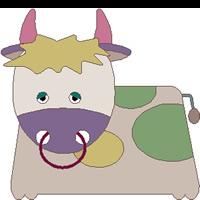ウシ の はなぐり
うし||は なぐり
||nostril
Bovine goring
むかし むかし 、 きっ ちょ むさん と 言う 、 とても ゆかいな 人 が い ました 。
||||||いう|||じん|||
||||||||pleasant||||
Once upon a time, there was a very cheerful person named Kicchomusan.
きっ ちょ むさん は 、 あまり お 金持ち で は あり ませ ん が 、 お 金 が なくなって くる と 、 ヒョイ と 、 いい 知恵 が 浮かんで くる のです 。
||||||かねもち||||||||きむ||||||||ちえ||うかんで||
||||||||||||||||||||||wisdom||||
Kicchomusan wasn't very wealthy, but when money started to run low, a good idea would suddenly come to his mind.
ある 日 の 事 、 きっ ちょ むさん は 畑 仕事 を し ながら 、 町 へ 行く 通りがかり の 人 を 呼び止めて は 、 「 すま ん が 、 町 の あらもの 屋 で 、 ウシ の はな ぐり を 買って きて ほしい んじゃ 。
|ひ||こと|||||はたけ|しごと||||まち||いく|とおりがかり||じん||よびとめて|||||まち|||や||うし|||ぐ り||かって|||
||||||||||||||||||||call over||||||||||||||||||
One day, while working in the fields, Kicchomusan called out to a passerby going to the town and said, 'Excuse me, could you please buy me a cow's nose hair from the junk shop in town?'
数 は 、 いく つ あって も いい 。
すう||||||
The number can be any number.
値段 は 、 なんぼ 高くて も かまわ ん 」 と 、 変な 事 を 頼み ました 。
ねだん|||たかくて|||||へんな|こと||たのみ|
||how much||||||||||
The price doesn't matter how expensive it is, I made a strange request.
みんな が 引き受けて くれ ました が 、 帰って きて 、 「 あいにく 、 売り切れ とる そうじゃ 。
||ひきうけて||||かえって|||うりきれ||そう じゃ
|||||||||sold out||
Everyone agreed to take on the task, but when they came back, they said, 'Unfortunately, it seems to be sold out.'
ウシ の 鼻 に つな を 通す 、 は なぐり の 輪 など 、 めったに 売れる もん で は ない から 、 ふだん は おいて ない そう じゃ 」 「 おれ も ずいぶん 探した が 、 一 つ も なかった 。
うし||はな||||とおす||||りん|||うれる|||||||||||||||さがした||ひと|||
||||||||||||rarely|||||||usually||||||||||||||
'Things like a nose ring for a cow, or a nose band, are rarely sold, so it seems they don't usually have them in stock.' 'I searched quite a bit too, but there wasn't a single one.'
『 今日 は いく 人 も 、 はな ぐり を 欲しい と いう 人 が きた 。
きょう|||じん|||ぐ り||ほしい|||じん||
Today, many people came who said they wanted hanaguri.
こんな 事 なら 、 たくさん 、 しいれて おけばよかった 』 と 、 くやし がっとった わい 」 と 、 口々に いい ました 。
|こと||||おけば よかった||||わ い||くちぐちに||
||||imported|should have bought||||||||
They all said, 'If I had known this would happen, I should have stocked up a lot more.'
「 それ は どうも 、 す まん 事 じゃ った 」 きっ ちょ むさん は 、 ガッカリ する どころか 、 喜び ながら 家 に 帰り ました 。
|||||こと|||||||がっかり||どころ か|よろこび||いえ||かえり|
||||||||||||||not only||||||
Kicchomu-san said, 'I am truly sorry about that,' but instead of feeling disappointed, he happily went home.
さて 次の 朝 、 きっ ちょ むさん は 、 作って ためて おいた ウシ の はな ぐり を 、 町 へ かついで 行って 、 「 ウシ の はな ぐり は いり ませ ん か ?
|つぎの|あさ|||||つくって|||うし|||ぐ り||まち|||おこなって|うし|||ぐ り|||||
||||||||saved|||||||||||||||||||
The next morning, Kit Chomu went to town to waddle the cow's field that he had made and saved, and asked, "Don't you want the cow's field?
」 町 中 の あらもの 屋 を まわり ました 。
まち|なか|||や|||
We visited the hail shops all over town.
「 これ は いい ところ に きて くれた 。
"This is a great place you've come to."
いく つ でも おいて いって くれ 」 昨日 、 もうけ そこなって いる ので 、 どこ の あらもの 屋 でも 、 喜んで しいれて くれ ました 。
||||||きのう||||||||や||よろこんで|||
|||||||profit||||||junk||||||
Please leave as many as you want. Yesterday, since I lost my chance, any second-hand shop gladly took it in.
「 さあ 、 これ で 、 昨日 の お 客 が 来て くれれば 、 ひともうけ できる ぞ 」 あらもの 屋 は 、 もう け の そろばん を はじき ました が 、 ウシ の はな ぐり は 、 さっぱり 売れ ませ ん 。
|||きのう|||きゃく||きて||ひと もうけ||||や||||||||||うし|||ぐ り|||うれ||
|||||||||||||||||||||calculated|||||||||||
Well then, if the customer from yesterday comes, we can make a profit. The second-hand shop calculated the profits, but the cow nose hair simply wouldn't sell.
もうかった の は 、 きっ ちょ むさん だけ でした 。
profited|||||||
The only one who made a profit was Kicchomu-san.
おしまい

